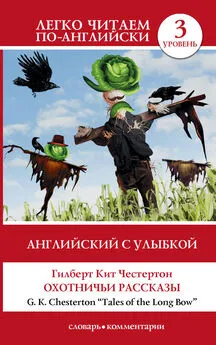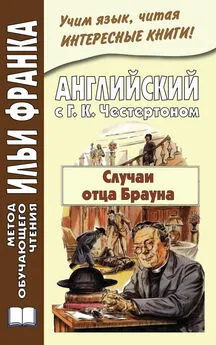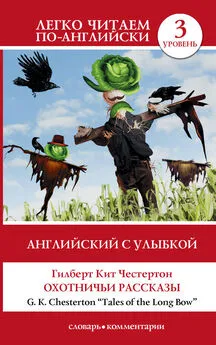Гилберт Честертон - Английский с улыбкой. Охотничьи рассказы / Tales of the Long Bow
- Название:Английский с улыбкой. Охотничьи рассказы / Tales of the Long Bow
- Автор:
- Жанр:
- Издательство:Литагент АСТ
- Год:2017
- Город:Москва
- ISBN:978-5-17-095438-4
- Рейтинг:
- Избранное:Добавить в избранное
-
Отзывы:
-
Ваша оценка:
Гилберт Честертон - Английский с улыбкой. Охотничьи рассказы / Tales of the Long Bow краткое содержание
Для удобства читателя текст сопровождается комментариями и кратким словарем.
Издание предназначается для продолжающих изучать английский язык (уровень 3 – Intermediate).
Английский с улыбкой. Охотничьи рассказы / Tales of the Long Bow - читать онлайн бесплатно ознакомительный отрывок
Интервал:
Закладка:
He was looking at this article and with as much surprise as when he had first read it, when the Colonel entered with a newspaper in his hand.
“I say,” he said, “I think it is getting rather ridiculous. I’m not a revolutionist like you; quite the opposite. But all these rules and regulations are getting beyond all rational explanation. A little while ago they started forbidding all travelling circuses; not, as you might think, demanding proper conditions for the animals, but forbidding them altogether for some nonsense about the safety of the public. There was a travelling circus stopped near Acton and another on the road to Reading. Crowds of village boys must never see a lion in their lives, because once in fifty years a lion has escaped and been caught again. But that’s nothing compared to what has happened since. Now there is such mortal fear of infection that we should leave the sick to suffer, just as if we were barbarians. You know those new hospital trains that were started to take patients from the hospitals down to the health resorts. Well, they will not run after all, it seems, because by merely taking an invalid of any sort through the open country we could poison the four winds of heaven. If this nonsense goes on, I will go as mad as Hilary himself.”
Hilary Pierce had arrived during this conversation and sat listening to it with a rather curious smile. Somehow the more Hood looked at that smile the more it puzzled him; it puzzled him as much as the newspaper article in his hand. He caught himself looking from one to the other, and Pierce smiled in a still more irritating manner.
“You don’t look so fierce and fanatical as when we last met, my young friend,” remarked Owen Hood. “Have you got tired of pigs and police-courts? These new laws the Colonel’s talking about would have roused you to lift the roof off at once.”
“Oh, I’m all against the new rules,” answered the young man coolly. “I’ve been very much against them. In fact, I’ve already broken all those new laws and a few more. Could you let me look at that article for a moment?”
Hood handed it to him and he nodded, saying:
“Yes; I was arrested for that.”
“Arrested for what?”
“Arrested for being a rich and respectable old lady,” answered Hilary Pierce; “but I managed to escape that time. It was a fine sight to see the old lady jump over a hedge and run across a field.”
Hood looked at him under his low eye-brows and his mouth began to work.
“But what’s all this about the old lady having a pug or a pet or something?”
“Well, it was very nearly a pug,” said Pierce calmly. “I pointed out to everybody that it was, as it were, almost a pug. I asked if it was just to punish me for a small mistake in spelling.”
“I begin to understand,” said Hood. “You were again smuggling pigs down to your precious Blue Boar, and thought you could break the enemy lines in very rapid cars.”
“Yes,” replied the smuggler happily. “We were quite literally Road-Pigs. I thought at first about dressing the pigs up as millionaires and members of Parliament; but when you come to look close, there’s more difference than you would imagine. It was great fun when they forced me to take my pet out of all the shawls, and they found what a large pet it was.”
“And do I understand,” cut in the Colonel, “that it was something like that – with the other laws?”
“The other laws,” said Pierce, “are certainly irrational, but you do not altogether do them justice. You do not quite understand their motive. You do not fully realise their origins. I may say with modesty, I believe that I was their origin. I not only had the pleasure of breaking those laws, but the pleasure of making them.”
“More of your tricks, you mean,” said the Colonel; “but why don’t the newspapers say so?”
“The authorities don’t want them to,” answered Pierce. “The authorities won’t advertise me, you bet. I’ve got far too much popular support for that. When the real revolution happens, it won’t be mentioned in the newspapers.”
He paused a moment in meditation and then went on.
“When the police searched for my pug and found it was a pig, I started wondering how they could be stopped from doing it again. I thought that they might not want to touch a wild pig or a pug that bit them. So, of course, I travelled the next time with dreadfully dangerous animals in cages, warning everybody of the angriest tigers and panthers that were ever known. When they found out what the tigers really were, they didn’t want to make this information public, so they could only fall back on their own stupid idea of a total prohibition. Of course, it was the same with my other idea, about the sick people going to health resorts to be cured of various fashionable and aristocratic illnesses. The pigs spent some time as aristocrats and rich people in beautifully decorated railway carriages with hospital nurses to take care of them; while I stood outside and told the railway officials that the best treatment for the patients was rest, and they must not be disturbed for any reason.”
“What a liar you are!” exclaimed Hood in simple admiration.
“Not at all,” said Pierce with dignity. “It was quite true that they were going to be cured.”
Crane, who had been staring rather absentmindedly out of the window, slowly turned his head and said:“And how’s it going to end? Do you propose to go on doing all these impossible things?”
Pierce jumped on his feet with the same romantic enthusiasm that he had when he made his vow over the pig-sty.
“Impossible!” he cried. “You don’t know what you’re saying or how true it is. All I’ve done so far was possible and prosaic. But I will do an impossible thing. I will do something that is written in all books and poems as impossible – something that has become a proverb about impossible things. The war is not ended yet; and if you two fellows will position yourselves on the hill opposite the Blue Boar, next Thursday at sunset, you will see something so impossible and so self-evident that even the newspapers will find it hard to hide it.”
A week later two gentlemen of something more than middle age who had not altogether lost the appetite for adventure positioned themselves under the roof of pine on the top of the hill with all the preparations for a picnic. It was from that place, like from a window looking across the valley, that they saw what looked more like a vision; what looked indeed rather like the parody of an apocalypse. The sky in the west was the colour of a lemon, pale yellow and pale green, while one or two small clouds on the horizon were of a rose-red and even richer colours. But the settling sun itself was a cloudless fire, so that a brownish light lay over the whole landscape. The inn of the Blue Boar standing opposite looked almost like a house of gold. Owen Hood was looking in his dreamy manner, and said at last:
“There’s an apocalyptic sign in heaven for you to start with. It’s strange, but that cloud coming up the valley looks very much like a pig.”
“Like a whale,” said Colonel Crane, yawning slightly; but when he turned his eyes in that direction, he saw that the object in question was too solid for a cloud.
“That’s not a cloud,” he said, “it’s a Zeppelin or something.”
The solid shape grew larger and larger; and as it became more obvious it became more incredible.
“Saints and angels!” cried Hood suddenly. “Why, it IS a pig!”
“It’s shaped like a pig all right,” said the Colonel quickly; and indeed as the great balloon came closer and closer, they could see that the long sausage-shaped Zeppelin body of it had been fantastically decorated with hanging ears and legs, to complete that pantomimic resemblance.
“I suppose it’s one more of Hilary’s tricks,” remarked Hood; “but what is he going to do now?”
When the great monster was moving up the valley it paused over the inn of the Blue Boar, and something fell fluttering from it like a brightly coloured feather.
“People are coming down in parachutes,” said the Colonel shortly.
“They’re strange-looking people,” remarked his companion, peering under frowning brows, for the level light was dazzling to the eyes. “By George, they’re not people at all! They’re pigs!”
From that distance, the objects in question looked a little bit like angels in some brightly coloured Gothic picture, with the yellow sky instead of their golden background. Their parachutes looked like a gorgeous painted plumage. The more the two men on the ground stared at these strange objects, the more certain it seemed that they were indeed pigs; though it was impossible to say whether the pigs were dead or alive from that distance. The men looked down into the garden of the inn into which the feathered things were dropping, and they could see the figure of Joan Hardy standing in front of the old pig-sty, looking up into the sky.
“Extraordinary present for a young lady,” remarked Crane, “but I suppose when our mad young friend falls in love, he can only give impossible presents.”
The eyes of the more poetical Hood were full of larger visions, and he was hardly listening. But when the sentence ended he seemed to wake up from a trance and struck his hands together.
“Yes!” he cried in a new voice, “we always come back to that word!”
“Come back to what word?” asked his friend.
“‘Impossible,’” answered Owen Hood. “It’s the word that runs through his whole life, and our lives too for that matter. Don’t you see what he has done?”
“I see what he has done all right,” answered the Colonel, “but I’m not at all sure I understand what you want to say.”
“What we have seen is another impossible thing,” said Owen Hood; “a thing that the English language has made a challenge; a thing that a thousand songs and jokes and phrases have called impossible. We have seen pigs fly. [35]”
“It’s pretty extraordinary,” admitted Crane, “but it’s not as extraordinary as when thay are not allowed to walk.”
And they gathered their things and began to walk down from the high hill.
While they were walking, it was getting darker and darker, and soon they lost that sense of sitting right under the clouds. They almost felt like they had had a vision; and the voice of Crane came out of the dark like the voice of a person talking about a strange dream.
“The thing I can’t understand,” he said, “is how Hilary managed to DO all that by himself.”
“He really is a very wonderful fellow,” said Hood. “You told me he did incredible things in the War. And though now he uses his skills for these fanatical things now, it takes as much trouble to do one as the other.”
“It takes a lot more trouble to do it alone,” said Crane. “In the War we were organized.”
“You mean he must be more than an unusual person,” suggested Hood, “a sort of giant with a hundred hands or god with a hundred eyes. Well, a man will work terribly hard when he wants something very much; even a man who generally looks like a lazy poet. And I think I know what he wanted. He deserves to get it. It’s certainly his hour of triumph.”
“Mystery to me all the same,” said the Colonel frowning. “I wonder whether he’ll ever clear it up.”
Away on another part of the hill Hilary Pierce, who just landed, came towards Joan Hardy with uplifted arms.
“This is no time for false modesty,” he said. “It is the hour, and I come to you covered with glory —”
“You come covered with mud,” she said smiling, “and it’s that horrible red mud that takes so long to dry. It’s no use trying to brush it till —”
Читать дальшеИнтервал:
Закладка:




